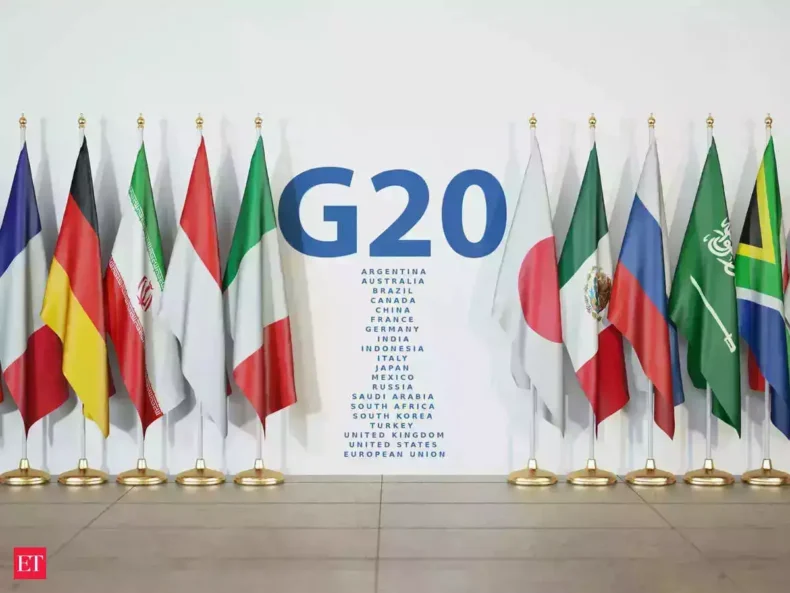India’s Prime Minister Narendra Modi has elevated India’s geopolitical relevance by using the traditionally subdued rotating presidency of the Group of 20 countries as a branding tool, highlighting India’s development as a significant voice on the international scene.

Table of Contents
India’s G20 Summit: Hopes For A Unified Communique
The G20 leaders’ summit, which will conclude India’s one-year leadership of the group of the world’s most important industrialised and developing nations, will take place this weekend in New Delhi, and the nation’s diplomats suddenly find themselves in a sprint against time to negotiate concrete global achievements.
In other significant tracks that it has hosted at prior G20 meetings, India has thus far been unable to promote agreement for a unified communiqué. Russia and China’s opposition to the phrase alluding to the conflict in Ukraine have been a major factor in member states’ inability to reach a consensus on obligatory measures.
The world’s most populous country, which also assumed the rotating leadership of the Shanghai Cooperation Organisation in a golden year for Indian diplomacy, runs into the possibility of having nothing to demonstrate for all of its efforts, which might undermine the reliability of the nation and Modi’s domestic narrative.
She wrote in an email to CNBC, “One of the potential hazards is that there are now hopes for India to provide some substantive accomplishments because of how elevated India’s G20 presidency has been.” In an effort to unite the Global South and promote itself as an interface between the Global South and the West, India has been using the G20. However, the issue with China and Russia still exists.
The likelihood of a significant development is slim given that both Chinese President Xi Jinping and Russian President Vladimir Putin will not be attending the summit on September 9–10. After the International Criminal Court issued an arrest order in March for Putin and his associates for war crimes in Ukraine, it is not known that he has left Russia.
Key Issues That Need to Be Addressed
Indeed, for the several G20 tracks that India has organised, the threat of the Russian takeover of Ukraine has dominated discussions. India had wanted to reach an agreement on a number of topics, including an arrangement for regulating cryptocurrencies and a remedy to the debilitating debt problems facing poor nations.
Other topics include the admittance of the African Union as a G20 member as well as changes in multilateral financial institutions as part of its aim to promote advancements in equitable development.
New Delhi has not been able to facilitate a single united statement in any of the major discussion tracks since India assumed the G20 leadership in December 2022, despite its neutral stance on the Ukraine situation. On the contrary, it has solely handled the overview and result documents for the unenforceable chair.
In reality, due to links to the Ukraine War, Russia separated itself from the position of the conclusion paper at a June conference on development concerns in Varanasi. China argued that the meeting’s conclusions shouldn’t make any mention of the turmoil in Ukraine.
“The original language was embraced by Russia at the Bali G20; and Indian diplomats, in fact, played an essential role in obtaining Russian approval on that,” Pramit Pal Chaudhuri, head of the South Asia practise at Eurasia Group.
But since that time, he continued, “Russia has reinforced its stance and has been accompanied by China in saying that we do not endorse the original body language, which is drawn from the UN Security Council resolution.
What Future Stands For India?
Sergei Lavrov, the foreign minister of Russia, has allegedly threatened that there won’t be an official proclamation at the G20 leaders’ summit in New Delhi if Russia’s viewpoint is not conveyed. Lavrov is going to represent Russia in lieu of Putin. According to the Kremlin, the invasion of Ukraine is an exclusive military strike in a conflict over the West’s intentions to topple Russia.
For Modi’s administration, which has organised nearly 200 G20 meetings in more than a dozen places throughout India, this may likely be a blow. Modi could yet cite more proof of India’s standing as a significant global actor in a year that saw New Delhi rise as a crucial partner of the United States in its Indo-Pacific agenda to restrain China’s might.













